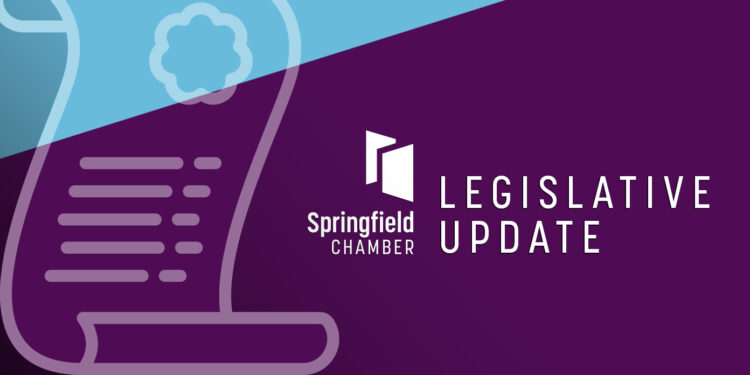Legislative Update: June 10, 2025

The Oregon Legislative Session is approaching it’s absolute deadline of June 29th. Here is what the Springfield Area Chamber of Commerce is watching from their Policy Agenda.
While there are no action items this week from the Springfield Chamber, a few of their priority bills are still at play as the final stretch of the legislative session approaches. One of the most surprising updates comes from Senate Bill 916 – which provides unemployment insurance for striking workers – which saw an unexpected down vote in the Senate this afternoon.
KEY POLICY UPDATES: Tracking our 2025 Legislative Priorities
Legislative developments impacting the Chamber’s 2025 Legislative Policy Agenda, are unfolding.
Unemployment Benefits for Striking
Workers (SB 916)
In an unexpected turn of events, SB 916, which passed through the House last week and went before the Senate today for a concurrence vote, was voted down after an original sponsor of the bill (Sen. Mark Meek, D-Gladstone) voted against it.
The Springfield Chamber of Commerce has joined other Chambers across Oregon in opposition to SB 916, citing fairness concerns for employers who pay into the unemployment system.
Transient Lodging Tax Flexible Use
(HB 3962)
The outcome of this bill is still uncertain as a new amendment (-13) will be released shortly; however, the Springfield Chamber remains watchful of this bill and opposes the diversion of TLT revenue away from tourism as it was originally intended. Read the Springfield Chamber’s letter of opposition here.
Transportation Package (HB 2025)
The Springfield Chamber is continuing to monitor the Transportation Package as it progresses. The package, House Bill 2025, has three public hearings scheduled for this week and is accepting public testimony:
GET ENGAGED: Help the Springfield Area Chamber of Commerce build a thriving business climate
Beyond our formal policy agenda, we’re monitoring workforce, education, and community issues that impact Springfield.
Read Oregon Business and Industry’s new Regulatory Impact Analysis
As of 2023, Oregon was the seventh most heavily regulated state in the nation, according to a study released in June 2025 by the Oregon Business & Industry Research and Education Foundation. Moreover, Oregon’s regulatory burden has been increasing rapidly, swelling by 5.6% between 2022 and 2023 alone. If that pace continues, Oregon’s regulations will double by 2036.
Read more from Oregon Business and Industry – including this month’s regulatory analysis – here.
Business Climate Survey
DEADLINE: JUNE 13
The purpose of the Business Climate Survey is to track trends and issues affecting businesses. Business decision makers are surveyed to identify emerging issues that may be addressed by the Springfield Chamber.
The Chamber is thankful to all who have completed the survey and shared it among their peers and colleagues. If you have yet to take the survey, don’t delay! The survey closes on Friday, June 13. Don’t miss the chance to contribute your input.
National Business Leaders Survey
DEADLINE: JUNE 30
The National Association of State Chambers, in collaboration with the Siena College Research Institute, is inviting business leaders to share their voices through the National Business Leaders Survey. This survey is open to businesses of any size and in any industry. This survey is designed to gather real insights into how businesses are feeling about today’s economic climate — both across the country and right here in Oregon.
Take the survey here: http://www.siena.edu/scri/NASC2025
The deadline to complete the survey is June 30th.
The Springfield Area Chamber of Commerce is monitoring all this legislation closely as part of its advocacy for policies that support a stable and predictable business environment. The Chamber will continue advocating for policies that support a strong, competitive business environment in Springfield and beyond. Stay tuned for updates in The Bottom Line.
- View Oregon State Chamber of Commerce’s updates in their newsletter here.
- Read Oregon Business and Industry’s Capitol Connect newsletter from Monday, June 9 here.
Springfield Area Chamber of Commerce Business Advocacy
The Springfield Area Chamber of Commerce is a trusted convener and provider of business resources. They recognize the systemic interdependencies of a healthy economy and provide an ear and a voice for local business at the confluence of government, commerce, and community. They advocate for business by increasing visibility, dialogue, and representation at local, state, and federal policy circles around issues of impact and interest to their members. Learn more about the Chamber’s Business Advocacy work.
Discover more from Springfield Bottom Line
Subscribe to get the latest posts sent to your email.






